CURRENT HPI TRAINEES

My research focuses on the development of extracellular vesicle (EV)-based therapeutics for the treatment of inflammatory complications arising from pathogenic infection (e.g. sepsis). Specifically, I aim to investigate the therapeutic potential of induced pluripotent stem cell (iPSC)-derived EVs as a treatment for dysregulated inflammation associated with microbial infection. In my preliminary studies, I have demonstrated that iPSC EVs have robust anti-inflammatory properties in an LPS-stimulated mouse macrophage model. However, the mechanism of action of iPSC EVs is unknown; understanding the molecular mechanisms behind the anti-inflammatory properties of iPSC EVs is critical to the clinical translation of these EVs as a novel therapy. Furthermore, in addition to the abrogation of inflammation, the rise of antibiotic resistant bacteria strains coupled with the lack of development of novel antibiotic drugs has created a need for the development of therapeutics that treat both the symptoms as well as the root cause (microbial infection) of sepsis. EVs are amenable to cargo loading via molecular engineering approaches, and therefore, my research also aims to load EVs with antimicrobial biomolecules in an attempt to synergize the inherent anti-inflammatory properties of iPSC EVs with the antimicrobial properties of loaded cargos towards the treatment of sepsis.

My research explores how mucin proteins normally contribute to the barrier function of the mucus layer, and how altered expression that occurs in the context of different disease states may impact susceptibility to viral infection. The mucus layer of the lungs is made up of two major components: a gel-forming viscoelastic layer of secreted mucins, and a periciliary layer (PCL) composed of transmembrane mucins. Knockout airway cultures of the secreted mucins MUC5B and MUC5AC, along with a mucin hydrogel developed to test secreted mucin ratios with various degrees of crosslinking that reflect health and disease will be used to assess the barrier function of MUC5B and MUC5AC towards influenza and other respiratory viruses. In the lab, KO cultures of the tethered mucin MUC1 showed enhanced influenza spread, however, less is known about the impact that other tethered mucins MUC4 and MUC16, each with different lengths, domain compositions, and cytoplasmic signaling domains, have on infection. Similarly, KO cultures of MUC4 and MUC16 will be used to explore the infection kinetics of IAV and other clinically relevant respiratory viruses.

Autoimmune disorders such as type 1 diabetes (T1D) are characterized by the mistaken attack of host tissue by the immune system. Current therapies for autoimmunity are non-curative and largely rely on suppression of immune responses. As a result, immunosuppressed patients are more vulnerable to infections by pathogens. Our lab has developed a platform to treat autoimmunity in a suppression-free manner by targeting regulatory immune cell expansion. This platform utilizes microparticles loaded with self-molecule and immunomodulator which are then injected directly into lymph nodes, important tissues where immune responses developed. My research aims to understand the mechanism of protection generated by these lymph node injected particles, as well as test if healthy immune responses to pathogens are preserved in lymph node treated mice.


My research focuses on the mechanisms viruses use to overcome the mucosal barrier in the respiratory tract and cause infection. I am currently investigating the interactions between Influenza A virus and airway mucus via video microscopy and multiple particle tracking. I hypothesize that Influenza A virus morphology influences virus diffusion to a greater extent than sialic acid binding. My project will provide new insights as to the nature of IAV penetration through the mucosal barrier.
 Group A Streptococcus (GAS) is a strict human pathogen with a significant global health burden. To cause disease, GAS must first successfully colonize and grow within the host tissues. This requires nutrient sensing and utilization, and expression of virulence genes to promote infection. One manner by which GAS is hypothesized to couple nutrient acquisition to virulence factor expression is through a family of regulators termed PRD-containing virulence regulators (PCVRs). PCVRs contain PRDs or PTS regulation domains, which are conserved domains that are capable of being phosphorylated by components of the phosphoenolpyruvate transferase system (PTS) that imports carbohydrates. PCVRs are thought to have evolved to modulate the expression of critical virulence genes in response to available carbohydrates, enhancing the pathogenic potential of organisms that have them. GAS has several hypothesized PCVRs, including a family of proteins known as RofA-Like Proteins (RALPs), which are the focus of my research. I seek to determine if the founding member of this family, RofA, is a PCVR and further characterize the role that RofA plays in GAS pathogenesis.
Group A Streptococcus (GAS) is a strict human pathogen with a significant global health burden. To cause disease, GAS must first successfully colonize and grow within the host tissues. This requires nutrient sensing and utilization, and expression of virulence genes to promote infection. One manner by which GAS is hypothesized to couple nutrient acquisition to virulence factor expression is through a family of regulators termed PRD-containing virulence regulators (PCVRs). PCVRs contain PRDs or PTS regulation domains, which are conserved domains that are capable of being phosphorylated by components of the phosphoenolpyruvate transferase system (PTS) that imports carbohydrates. PCVRs are thought to have evolved to modulate the expression of critical virulence genes in response to available carbohydrates, enhancing the pathogenic potential of organisms that have them. GAS has several hypothesized PCVRs, including a family of proteins known as RofA-Like Proteins (RALPs), which are the focus of my research. I seek to determine if the founding member of this family, RofA, is a PCVR and further characterize the role that RofA plays in GAS pathogenesis.
 Visceral leishmaniasis, a neglected tropical disease caused by Leishmania dononvani, is the second leading cause of parasitic deaths in the world. Although these parasites replicate uncontrollably once they have entered a host, they have a weakness: unlike most organisms, L. donovani are heme auxotrophs as they lack the ability to synthesize heme. This creates a unique opportunity to be exploited clinically at the Leishmania-host interface. The main objective of my research is to elucidate the molecular mechanisms of heme homeostasis at the Leishmania-host interface, and identify how this effects parasite growth and virulence.
Visceral leishmaniasis, a neglected tropical disease caused by Leishmania dononvani, is the second leading cause of parasitic deaths in the world. Although these parasites replicate uncontrollably once they have entered a host, they have a weakness: unlike most organisms, L. donovani are heme auxotrophs as they lack the ability to synthesize heme. This creates a unique opportunity to be exploited clinically at the Leishmania-host interface. The main objective of my research is to elucidate the molecular mechanisms of heme homeostasis at the Leishmania-host interface, and identify how this effects parasite growth and virulence.
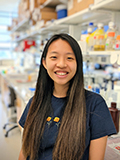 My research focuses on the engineering of probiotic E. coli to control the production of a crucial neurotransmitter and immunomodulator: γ-aminobutyric acid (GABA). To accomplish this, I am expressing its synthase GadB on the outer membrane of these cells and developing a system which enables signal-dependent degradation of proteins translocated to the outer surface of E. coli. I hope to use this engineered bacterium to interrogate the immune response and microbiome composition with the focus on human GI tract in the future.
My research focuses on the engineering of probiotic E. coli to control the production of a crucial neurotransmitter and immunomodulator: γ-aminobutyric acid (GABA). To accomplish this, I am expressing its synthase GadB on the outer membrane of these cells and developing a system which enables signal-dependent degradation of proteins translocated to the outer surface of E. coli. I hope to use this engineered bacterium to interrogate the immune response and microbiome composition with the focus on human GI tract in the future.
- Gold, KM, Leday, TV, Kinkel, TL, and McIver KS (2009) TrxR, a two-component response regulator that activates virulence in the M1 serotype group A streptococcus, Mid-Atlantic Microbial Pathogenesis Meeting, Wintergreen, VA.
- Gold, KM and McIver, KS (2009) Characterization of the TrxSR two-component signal transduction system that activates virulence in S. pyogenes, Conference Functional Genomics of G+ Bacteria, San Diego, CA.
- Gold, KM, Murosko, DC, and McIver, KS (2011) Characterization of the TrxSR Two-Component Signal Transduction System of S. pyogenes, Conference on Gram-Positive Microorganisms, Pisa, Italy. (TALK)
- Gold, KM, Murosko, DC, and McIver, KS (2011) Characterization of the TrxSR Two-Component Signal Transduction System of Streptococcus pyogenes, CrossTalk Symposium on Host-Pathogen Interactions, Shady Grove, MD. (TALK)
- Goldhaber Intl. Travel Award 2011
- MOCB-CA BISI Travel Award 2011
- Andrew Moyer Award 2011
- ORISE Postdoctoral Fellow, FDA, Bethesda, MD; EPA, Raleigh, NC
- Research Scientist, Velocity Sciences, Boulder, CO
- Goncalves, R, Zhang, X, Cohen, HB, Debrabant, A, and Mosser, DM (2011) Journal of Experimental Medicine, 208(6):1253-1265.
- Cohen, HB, and Mosser, DM (2013) Journal of Leukocyte Biology, 94(5):913-9.
- Cohen, HB, Briggs, KT, Marino, JP, Ravid, K, Robson, S, and Mosser, D.M. (2013) Blood, 122(11):1935-45.
- Cohen, HB, and Mosser, D.M. (2014) Immunity 40(1):3-5.
- Cohen, HB, Ward, A, Hamidzadheh, K, Ravid, K, and Mosser, DM (2015) Journal of Immunology 195(8):3828-3837.
- Cohen, HB and Mosser, DM (2011) Sensing Danger: How Purinergic Signaling Regulates Macrophage Function During Inflammation". CrossTalk Symposium on Host-Pathogen Interactions, Shady Grove, MD. (TALK)
- Cohen, HB and Mosser, D.M. (2011) ATP Hydrolysis Regulates Classical Macrophage Activation during inflammation via CD39-dependent mechanism. UMCP Bioscience and Technology Research Symposium, College Park, MD
- Cohen, HB and Mosser, DM (2012) ATP Hydrolysis Regulates Classical Macrophage Activation by a Cell-Intrinsic, CD39-dependent Mechanism. Midwinter Conference of Immunologists, Asilomar, CA
- Cohen, HB and Mosser, DM (2012) Cell-intrinsic Control of Macrophage Activation by CD39 and Implications for Disease, Annual Meeting of the Society for Leukocyte Biology. Maui, HI. (TALK)
- Society of Leukocyte
- Biology Presidential Award (2013)
- McDonald Graduate Service Award (2013)
- Andrew Moyer Outstanding Graduate Student Award 2014
- Postdoctoral Fellow , EMD Serono Inc. (2014-2016)
- Research Scientist , Jounce Therapeutics, Inc.
- Nakayama, S, Kelsey, I, Wang, J, Roelofs, KG, Stefane, B, Luo, Y, Lee, VT, and Sintim HO (2011) Journal of the American Chemical Society, 133(13):4856-4864.
- Roelofs, KG, Wang, J, Sintim, HO, and Lee, VT (2011) PNAS 108:15528-15533.
- Donaldson, GP, Roelofs, KG, Luo, Y, Sintim, HO, and Lee, VT (2012) Nucleic Acids Research, 40(7):e48
- Nakayama, S, Roelofs, KG, Lee, VT, and Sintim HO (2012) Molecular Biosystems, 8(3):726-729.
- Corrigan, RM, Campeotto, I, Jeganathan, T, Roelofs, KG, Lee, VT, and Grundling, A (2013) PNAS 110(22):9084-9089.
- Roelofs, KG, Jones, CJ, Helman, SR, Shang, X, Orr, MW, Goodson, JR, Galperin, MY, Yildiz, FH and Lee, VT (2015) PloS Pathogens, 11(10):e1005232
- Roelofs, KG, Wang, J, Sintim, HO, and Lee, VT (2011) Differential radial capillary action of ligand assay for high-throughput detection of metabolite interactomes, Cold Spring Harbor Microbial Pathogenesis and Host Response Meeting, Cold Spring Harbor, NY
- Roelofs, KG, Wang, J, Sintim, HO, and Lee, VT (2011) Differential radial capillary action of ligand assay for high-throughput detection of metabolite interactomes, CrossTalk Symposium on Host-Pathogen Interactions, Shady Grove, MD. (TALK)
- Roelofs, KG, Wang, J, Sintim, HO, and Lee, VT (2011) Differential radial capillary action of ligand assay for high-throughput detection of metabolite interactomes, Mid-Atlantic Microbial Pathogenesis Meeting, Wintergreen, VA
- Roelofs, KG, Wang, J, Sintim, HO, and Lee, VT (2013) Systematic identification of cyclic-di-GMP binding proteins in Vibrio cholerae, Mid-Atlantic Microbial Pathogenesis Meeting, Wintergreen, VA
- Roelofs, KG, Wang, J, Sintim, HO, and Lee, VT (2013) Systematic identification of cyclic-di-GMP binding proteins in Vibrio cholerae, Gordon Research Conference on Microbial Stress Response, NH
- Goldhaber Travel Award 2013
- MOCB-CA BISI Travel Award 2011-13
- Andrew Moyer Award 2013
- Intl. Patent Filed: LS-2010-086 The DRACALA Technology
- Intl. Patent Filed: LS-2011-021 Modifications of DRACALA
- Postdoctoral Fellow , Dr. Laurie Comstock , Harvard University (2014-2016)
- Research Scientist , Finch Therapeutics , Boston, MA
- Lecturer, College of Southern Maryland and Northern Virginia Community College
- Contributing Author, ModVive
- ASM General Meeting Outstanding Student Poster Award (2012)
- ASM General Meeting Travel Award (2012)
- ASM General Meeting Finkelstein Award in Microbial Pathogenesis-Finalist (2012)
- NSF Graduate Research Fellowship
- DoD Science & Engineering Graduate Fellowship (declined)
- BISI Graduate Merit Fellowship
- Sundar, GS, Valdes, KM, Vega, LA, Belew, AT, Islam, E, Binet, R, El-Sayed, NM, Le Breton, Y, and McIver, KS (2014) Impact of a putative PTS fructose transporter on the physiology and virulence of the group A streptococcus, CrossTalk Symposium on Host-Pathogen Interactions, Shady Grove MD. (TALK)
- Sundar, GS, Le Breton, Y, and McIver, KS (2016) A promiscuous sugar transporter influences SLS-mediated hemolysis in the group A streptococcus, ASM International Streptococcal Genetics Conference, Washington, DC. (TALK)
- BISI-MOCB Travel Award
- G+ Pathogens Mtng. Travel Award
- Hokenson Endowed Fellowship
- ASM Strep Genetics Travel Award
- Andorko, JI, Tostanoski, L.H., and Jewel, C.M. (2013) Engineering immune response with biomaterials, Biotech Community Meeting, Frederick, MD (TALK)
- Andorko, JI and Jewel, C.M. (2013) Investigating biomaterial impact onlymph node organization and immunity, Fischell Festival, College Park, MD
- Andorko, JI and Jewel, C.M. (2014) Intrinsic immunogenicity of rapidly degradable polycations: role of physiochemical properties, Keystone Symposium on Modes of Action of Vaccines & Adjuvants, Seattle, WA
- Andorko, JI and Jewel, C.M. (2015) Investigating the immunogenicity of synthetic polymers with properties that mimic pathogens, CrossTalk Symposium on Host-Pathogen Interactions, Baltimore, MD. (TALK)
- Northeast Bioengineering Conference Outstanding Student Poster (2014)
- Keystone Future of Science Scholarship for Keystone Vaccine Symposium (2014)
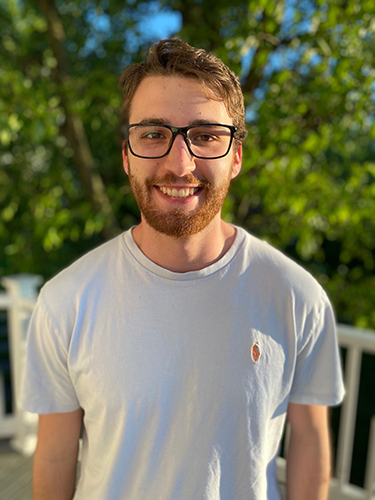 Mycobacterium tuberculosis (Mtb), the causative agent of tuberculosis, is one of the oldest human pathogens. It remains a public health issue and new therapeutic approaches for treating the disease must be found. These approaches may be discovered by better understanding the host-pathogen interactions that underlie Mtb infection. In response to Mtb infection, hosts generate interferons (IFNs) to upregulate and modulate the immune response. While high levels of type I IFN (e.g. IFN-β) are associated with host susceptibility to Mtb, recent research has shown that Mtb selectively inhibits type I IFN signaling in host cells. My research aims to determine how Mtb inhibits type I IFN signaling as well as understanding the greater context of this inhibition.
Mycobacterium tuberculosis (Mtb), the causative agent of tuberculosis, is one of the oldest human pathogens. It remains a public health issue and new therapeutic approaches for treating the disease must be found. These approaches may be discovered by better understanding the host-pathogen interactions that underlie Mtb infection. In response to Mtb infection, hosts generate interferons (IFNs) to upregulate and modulate the immune response. While high levels of type I IFN (e.g. IFN-β) are associated with host susceptibility to Mtb, recent research has shown that Mtb selectively inhibits type I IFN signaling in host cells. My research aims to determine how Mtb inhibits type I IFN signaling as well as understanding the greater context of this inhibition.
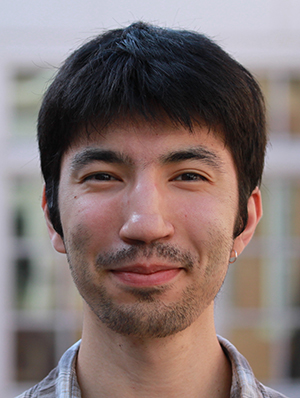 My research focuses on studying on the ability of bacterial pathogens can cause healthcare-associated infections. I am currently using a murine model of catheter-associated urinary tract infection using Pseudomonas aeruginosa, one of the ESKAPE pathogens associated with healthcare-associated infections. I am investigating the requirement of bacterial virulence factors during device-associated infections.
My research focuses on studying on the ability of bacterial pathogens can cause healthcare-associated infections. I am currently using a murine model of catheter-associated urinary tract infection using Pseudomonas aeruginosa, one of the ESKAPE pathogens associated with healthcare-associated infections. I am investigating the requirement of bacterial virulence factors during device-associated infections.
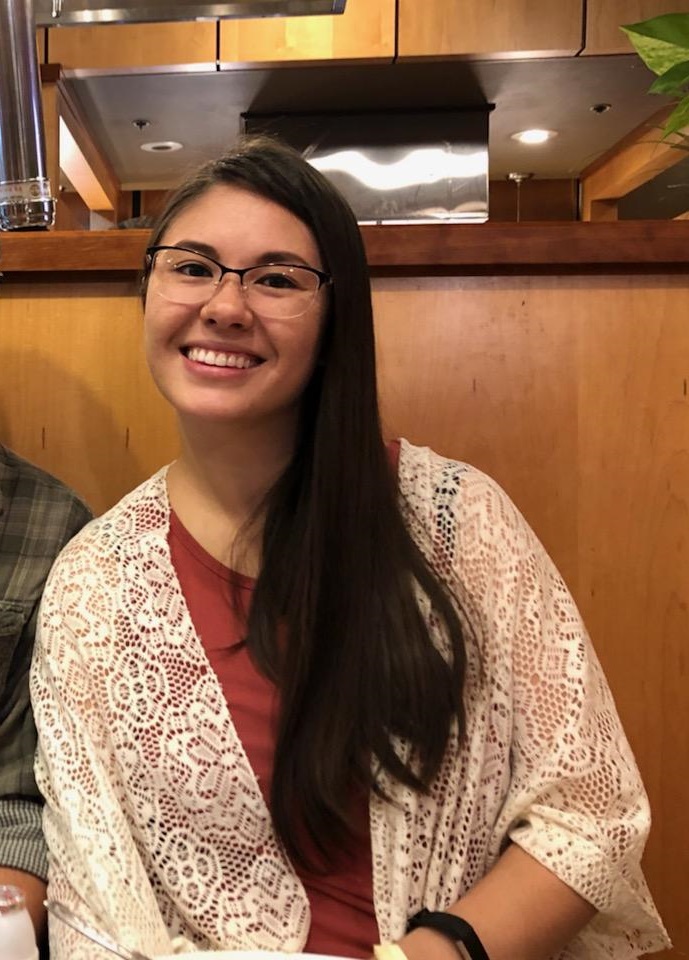 Cryptococcus neoformans is an opportunistic fungal pathogen, and a leading cause of death among HIV-infected individuals. These encapsulated yeast fungi are distributed throughout the environment and are readily inhaled into the respiratory tract where they initially cause pulmonary infection. If the host immune system fails to contain the fungal cells within the lung, the organism will disseminate to the brain via the bloodstream, resulting in fatal meningoencephalitis. As such, the host immune responses in the lung are critical for determining the progression of the disease. My current research focuses on how resident and recruited immune cells act to limit or promote growth and subsequent dissemination of C. neoformans. It is our hope that by better understanding the differential roles of these cell populations during cryptococcosis, therapies targeting host components may be developed which aim to reduce pulmonary fungal burdens and limit the spread to the central nervous system.
Cryptococcus neoformans is an opportunistic fungal pathogen, and a leading cause of death among HIV-infected individuals. These encapsulated yeast fungi are distributed throughout the environment and are readily inhaled into the respiratory tract where they initially cause pulmonary infection. If the host immune system fails to contain the fungal cells within the lung, the organism will disseminate to the brain via the bloodstream, resulting in fatal meningoencephalitis. As such, the host immune responses in the lung are critical for determining the progression of the disease. My current research focuses on how resident and recruited immune cells act to limit or promote growth and subsequent dissemination of C. neoformans. It is our hope that by better understanding the differential roles of these cell populations during cryptococcosis, therapies targeting host components may be developed which aim to reduce pulmonary fungal burdens and limit the spread to the central nervous system.
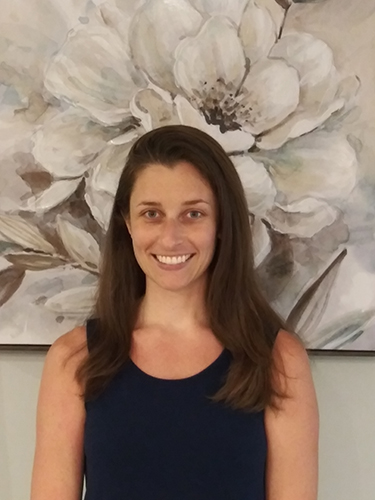 My research focuses on engineering mesenchymal stem cell derived extracellular vesicles (MSC EVs) capable of effective immunomodulation during severe illness. More specifically, my goal is to develop a novel EV therapeutic intervention for sepsis, a deadly and dysregulated immune response that often results from the presence of a pathogenic microorganism. MSC EVs have demonstrated the ability to confer the anti-inflammatory potential of their parental cells in a wide array of applications, including sepsis. However, low potency and the lack of a standardized and scalable biomanufacturing process remain two of the greatest challenges to the clinical translation of MSC EVs. As it is known that the cellular microenvironment has profound effects on subsequently secreted EVs, I am focusing on modulating biochemical and biophysical cues during MSC culture in order to enhance the production and anti-inflammatory effects of MSC EVs. This research will inform an EV therapeutic platform capable of a translatable sepsis therapy as well as build the necessary foundation for the development of EV therapies for other inflammatory-based diseases and anti-pathogen applications.
My research focuses on engineering mesenchymal stem cell derived extracellular vesicles (MSC EVs) capable of effective immunomodulation during severe illness. More specifically, my goal is to develop a novel EV therapeutic intervention for sepsis, a deadly and dysregulated immune response that often results from the presence of a pathogenic microorganism. MSC EVs have demonstrated the ability to confer the anti-inflammatory potential of their parental cells in a wide array of applications, including sepsis. However, low potency and the lack of a standardized and scalable biomanufacturing process remain two of the greatest challenges to the clinical translation of MSC EVs. As it is known that the cellular microenvironment has profound effects on subsequently secreted EVs, I am focusing on modulating biochemical and biophysical cues during MSC culture in order to enhance the production and anti-inflammatory effects of MSC EVs. This research will inform an EV therapeutic platform capable of a translatable sepsis therapy as well as build the necessary foundation for the development of EV therapies for other inflammatory-based diseases and anti-pathogen applications.
 Sofia’s research is to understand the mechanism by which estrogen regulates Neisseria gonorrhoeae (GC) infection in the human cervix, the gate of the female reproductive tract. Most GC infection in women is asymptomatic, and untreated infections can lead to severe complications in women, including chronic pelvic inflammatory disease and increased risk of ectopic pregnancy. Despite the far-reaching implications for women's health, the underlying mechanism behind this wide range of clinical outcomes remains unclear. She hypothesizes that estrogen regulates GC infection by modulating the expression of GC host receptors and the barrier function of the cervical epithelium through estrogen receptor signaling and interplay with epidermal growth factor receptor (EGFR). Using a human cervical tissue explant model established in the Song Lab, Sofia’s preliminary studies found that estrogen treatment induced morphological changes in the endocervix that mimicked those observed in vivo. Estrogen treatment differentially influenced GC infectivity in the three regions of the human cervix, increasing GC colonization in the ectocervix and endocervix but reducing GC penetration in the endocervix compared to untreated controls. However, GC infectivity in the transformation zone, located between the ectocervix and endocervix, was not affected by estrogen. Further, estrogen treatment and expression of opacity-associated proteins (Opas) both reduced immunofluorescence staining levels of EGFR in GC-colonized endocervical epithelial cells, but did not significantly affect EGFR staining levels in colonized epithelial cells in the transformation zone and ectocervix. Her results suggest that estrogen may drive localized asymptomatic GC infection by enhancing GC colonization and suppressing penetration, probably through manipulating EGFR expression and signal transduction.
Sofia’s research is to understand the mechanism by which estrogen regulates Neisseria gonorrhoeae (GC) infection in the human cervix, the gate of the female reproductive tract. Most GC infection in women is asymptomatic, and untreated infections can lead to severe complications in women, including chronic pelvic inflammatory disease and increased risk of ectopic pregnancy. Despite the far-reaching implications for women's health, the underlying mechanism behind this wide range of clinical outcomes remains unclear. She hypothesizes that estrogen regulates GC infection by modulating the expression of GC host receptors and the barrier function of the cervical epithelium through estrogen receptor signaling and interplay with epidermal growth factor receptor (EGFR). Using a human cervical tissue explant model established in the Song Lab, Sofia’s preliminary studies found that estrogen treatment induced morphological changes in the endocervix that mimicked those observed in vivo. Estrogen treatment differentially influenced GC infectivity in the three regions of the human cervix, increasing GC colonization in the ectocervix and endocervix but reducing GC penetration in the endocervix compared to untreated controls. However, GC infectivity in the transformation zone, located between the ectocervix and endocervix, was not affected by estrogen. Further, estrogen treatment and expression of opacity-associated proteins (Opas) both reduced immunofluorescence staining levels of EGFR in GC-colonized endocervical epithelial cells, but did not significantly affect EGFR staining levels in colonized epithelial cells in the transformation zone and ectocervix. Her results suggest that estrogen may drive localized asymptomatic GC infection by enhancing GC colonization and suppressing penetration, probably through manipulating EGFR expression and signal transduction.
 Shannon’s doctoral research focuses on how the persistence of immune signals within lymph nodes (LNs)–tissues that control immune function– influence the rate, magnitude, and type of immune response. This knowledge will reveal how adjuvant and antigen availability affects T cell polarization against pathogens to ultimately inform rational vaccine design. Due to the lack of spatial and temporal control with soluble molecules, biomaterials are being widely explored as vaccine carriers to protect cargo while offering tunable release. She is using poly(lactide-co-glycolide) (PLGA), a biodegradable polymer with variants that exhibit diverse release profiles, to encapsulate adjuvant and antigen into microparticles (MPs) to investigate how immune responses vary as a function of delivery kinetics. To control the dose of immune signals delivered to LNs, the Jewell lab has developed a platform for direct injection into LNs. Using this platform with PLGA MPs, Shannon has shown that this tool allows precise control over vaccine cargo deposition within LNs. I hypothesize MPs with fast release kinetics will result in shorter more potent primary immune responses, while slow release MPs promote more effective memory responses. These studies will reveal how immune signal persistence polarizes systemic responses and provide a functional link to adjuvant and antigen delivery kinetics.
Shannon’s doctoral research focuses on how the persistence of immune signals within lymph nodes (LNs)–tissues that control immune function– influence the rate, magnitude, and type of immune response. This knowledge will reveal how adjuvant and antigen availability affects T cell polarization against pathogens to ultimately inform rational vaccine design. Due to the lack of spatial and temporal control with soluble molecules, biomaterials are being widely explored as vaccine carriers to protect cargo while offering tunable release. She is using poly(lactide-co-glycolide) (PLGA), a biodegradable polymer with variants that exhibit diverse release profiles, to encapsulate adjuvant and antigen into microparticles (MPs) to investigate how immune responses vary as a function of delivery kinetics. To control the dose of immune signals delivered to LNs, the Jewell lab has developed a platform for direct injection into LNs. Using this platform with PLGA MPs, Shannon has shown that this tool allows precise control over vaccine cargo deposition within LNs. I hypothesize MPs with fast release kinetics will result in shorter more potent primary immune responses, while slow release MPs promote more effective memory responses. These studies will reveal how immune signal persistence polarizes systemic responses and provide a functional link to adjuvant and antigen delivery kinetics.
 My research focuses on studying native proteins involved in extracellular RNA transport, and engineering them with the goal of delivering therapeutic RNA to non-hepatic targets. Currently, I am looking into two RNA delivery vehicles: high density lipoprotein (HDL) to deliver siRNA to immune cells, and retroviral Arc capsid to deliver mRNA to neurons.
My research focuses on studying native proteins involved in extracellular RNA transport, and engineering them with the goal of delivering therapeutic RNA to non-hepatic targets. Currently, I am looking into two RNA delivery vehicles: high density lipoprotein (HDL) to deliver siRNA to immune cells, and retroviral Arc capsid to deliver mRNA to neurons.
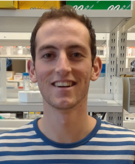 My research explores the molecular host-virus interplay of rhinovirus C, a newly discovered virus posing significant public health issues from virus-induced exacerbations in acute and chronic lung disease. As rhinovirus C tropism is naturally limited to humans and chimpanzees only, in order to best study viral pathogenesis an animal model recapitulating the disease needs to be established. Exploring both viral and host requirements, my project will lay the foundation toward developing an in vivo small animal model system to study rhinovirus C pathogenesis.
My research explores the molecular host-virus interplay of rhinovirus C, a newly discovered virus posing significant public health issues from virus-induced exacerbations in acute and chronic lung disease. As rhinovirus C tropism is naturally limited to humans and chimpanzees only, in order to best study viral pathogenesis an animal model recapitulating the disease needs to be established. Exploring both viral and host requirements, my project will lay the foundation toward developing an in vivo small animal model system to study rhinovirus C pathogenesis.  Kristina’s research focuses on engineering systems for autonomous regulation of bacterial co-cultures or small consortia wherein each strain carries out a specific sub-function. To accomplish this, she studies the regulation of the native autoinducer-2 quorum sensing (QS) process in E. coli. She then applies this knowledge to engineer populations of bacteria that communicate amongst themselves and have non-native QS signal-mediated phenotypes.
Kristina’s research focuses on engineering systems for autonomous regulation of bacterial co-cultures or small consortia wherein each strain carries out a specific sub-function. To accomplish this, she studies the regulation of the native autoinducer-2 quorum sensing (QS) process in E. coli. She then applies this knowledge to engineer populations of bacteria that communicate amongst themselves and have non-native QS signal-mediated phenotypes. 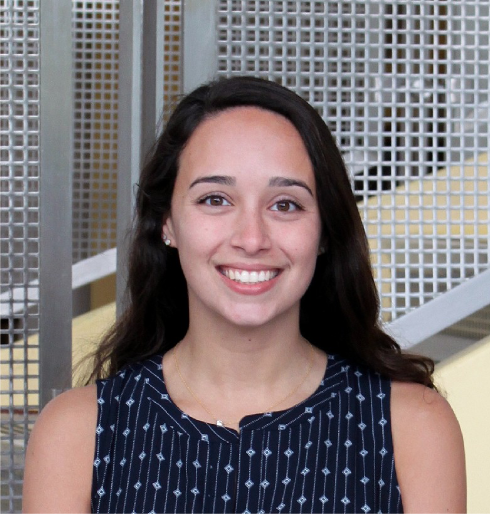 My research focuses on generating new insight into how combinations of peptide antigens and molecular adjuvants are trafficked by antigen presenting cells. This knowledge will create new ways to control antigen processing and presentation, and reveal how the changes direct T cell polarization against pathogens. The approach involves synthesis of self-assembled nanostructures – called immune-polyelectrolytes (iPEMs) – assembled entirely from peptide antigens and tunable combinations of toll-like receptor agonists (TLRa) that trigger pathogen-associated molecular pattern sensors (PAMPs). iPEMs create a modular platform to directly control the absolute and relative concentrations of antigens and adjuvants, without any other carriers or supports. I synthesized iPEMs from a cationic peptide antigen, SIINFEKLR9, and polyIC - a TLR3 agonist. I have also shown iPEMs are taken up in a dose dependent and energy dependent (i.e., endocytic) manner by primary dendritic cells (DCs). With support from HPI, I hope to dissect how the combinations and concentrations of antigen and adjuvants juxtaposed in iPEMs affects the uptake and processing by immune cells in primary cell culture models and relevant animal models. This insight could help to inform the more rational design of vaccine adjuvants.
My research focuses on generating new insight into how combinations of peptide antigens and molecular adjuvants are trafficked by antigen presenting cells. This knowledge will create new ways to control antigen processing and presentation, and reveal how the changes direct T cell polarization against pathogens. The approach involves synthesis of self-assembled nanostructures – called immune-polyelectrolytes (iPEMs) – assembled entirely from peptide antigens and tunable combinations of toll-like receptor agonists (TLRa) that trigger pathogen-associated molecular pattern sensors (PAMPs). iPEMs create a modular platform to directly control the absolute and relative concentrations of antigens and adjuvants, without any other carriers or supports. I synthesized iPEMs from a cationic peptide antigen, SIINFEKLR9, and polyIC - a TLR3 agonist. I have also shown iPEMs are taken up in a dose dependent and energy dependent (i.e., endocytic) manner by primary dendritic cells (DCs). With support from HPI, I hope to dissect how the combinations and concentrations of antigen and adjuvants juxtaposed in iPEMs affects the uptake and processing by immune cells in primary cell culture models and relevant animal models. This insight could help to inform the more rational design of vaccine adjuvants.  My research interests lie in understanding disease-causing pathogens relevant to human public health and working towards therapeutic strategies against these diseases. Currently, I am working in Dr. McIver’s lab where we use whole genome approaches to interrogate the physiology of a strict human pathogen, Streptococcus pyogenes (Group A Streptococcus/GAS), and studying the complex cellular mechanisms that allow this bacterium to respond to different environmental stimuli. I am interested in exploring the experimentally derived functions of genes that affect GAS fitness found in our screens during GAS infection. Studying these genes that have previously been designated as "unknown" or with putative functions.
My research interests lie in understanding disease-causing pathogens relevant to human public health and working towards therapeutic strategies against these diseases. Currently, I am working in Dr. McIver’s lab where we use whole genome approaches to interrogate the physiology of a strict human pathogen, Streptococcus pyogenes (Group A Streptococcus/GAS), and studying the complex cellular mechanisms that allow this bacterium to respond to different environmental stimuli. I am interested in exploring the experimentally derived functions of genes that affect GAS fitness found in our screens during GAS infection. Studying these genes that have previously been designated as "unknown" or with putative functions. 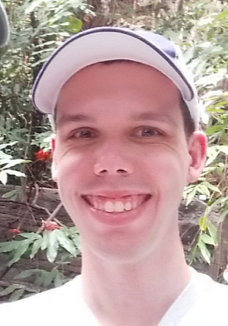 My research focuses on the pathogen Mycobacterium tuberculosis (Mtb), which is the causative agent of human pulmonary tuberculosis. Mycobacteria are covered by a mycolic acid layer in their cell envelope that can serve as a protective membrane. While this contributes to the hardiness of these organisms, it also makes secretion of proteins out of the cell challenging. In order to combat this, Mycobacteria utilize the type VII secretion systems (T7SS) as the major route for secretion past this barrier. Of the T7SS, only the ESX-5 system is found in slow-growing, pathogenic mycobacterial species. Our lab has previously shown that a Mtb paralog of the ESX-5 system, dubbed ESX-5A, has a role in protein secretion, inflammasome activation, and virulence. We believe that the two other paralogs of the ESX-5 system, dubbed ESX-5B and ESX-5C, may also act as accessory systems required for a fully functional ESX-5 system. My work currently seeks to understand the importance of these accessory systems on host response, virulence, and substrate secretion. Through this work we hope to provide a better understanding of the mechanisms of the ESX-5 system and their role in virulence mechanisms of Mtb.
My research focuses on the pathogen Mycobacterium tuberculosis (Mtb), which is the causative agent of human pulmonary tuberculosis. Mycobacteria are covered by a mycolic acid layer in their cell envelope that can serve as a protective membrane. While this contributes to the hardiness of these organisms, it also makes secretion of proteins out of the cell challenging. In order to combat this, Mycobacteria utilize the type VII secretion systems (T7SS) as the major route for secretion past this barrier. Of the T7SS, only the ESX-5 system is found in slow-growing, pathogenic mycobacterial species. Our lab has previously shown that a Mtb paralog of the ESX-5 system, dubbed ESX-5A, has a role in protein secretion, inflammasome activation, and virulence. We believe that the two other paralogs of the ESX-5 system, dubbed ESX-5B and ESX-5C, may also act as accessory systems required for a fully functional ESX-5 system. My work currently seeks to understand the importance of these accessory systems on host response, virulence, and substrate secretion. Through this work we hope to provide a better understanding of the mechanisms of the ESX-5 system and their role in virulence mechanisms of Mtb.
| Year of Entry (Prior Degree and Institution) | 2015 (B.S. Coll. William & Mary) |
|---|---|
| Mentor-Dept (Grad program) | Briken-CBMG (BISI-MOCB) |
| Time on Training Grant | July 2016 to June 2017 |
| Title of Research Project | Characterization of the ESX-5 Secretome and its Impacts on the Virulence of Mycobacterium tuberculosis |
| Publications | No Publications yet |
| Presentations | Banks DA, Dahal A, McFarland AG, Flowers BM, Stephens CA, Swack B, Gugssa A, Anderson WA, and Hinton SD (2017) Frontiers in Molecular Biosciences, 4:76. Banks DA, Ahlbrand SE, Hughitt VK, Shah S, Mayer-Barber KD, Vogel SN, El-Sayed NM, and Mosser DM (2019) Journal of Immunology, 202(8):2348-2359. |
| Awards and Fellowships | Dean's Fellowship (2015, 2016) |
| Degree Received (Year) | Current |
| Post Degree Positions (Grant Support) | In Training |
 My research focuses on the impact of antibiotics on bacterial metabolism. While the specific targets of antibiotics are well appreciated, the metabolic responses to antibiotics surprisingly remain poorly understood. To expand our fundamental understanding, I aim to explore the metabolic shifts resulting from antibiotic stress that occur in both susceptible and resistant strains of Escherichia coli. My approach involves integrating omics data from multiple biological scales with a genome-scale metabolic model (GSMM) of E. coli to generate metabolic flux predictions for both states. The overarching objective is to mechanistically elucidate how pathogenic E. coli strains of reductively constrain their metabolism under antibiotic conditions to survive.
My research focuses on the impact of antibiotics on bacterial metabolism. While the specific targets of antibiotics are well appreciated, the metabolic responses to antibiotics surprisingly remain poorly understood. To expand our fundamental understanding, I aim to explore the metabolic shifts resulting from antibiotic stress that occur in both susceptible and resistant strains of Escherichia coli. My approach involves integrating omics data from multiple biological scales with a genome-scale metabolic model (GSMM) of E. coli to generate metabolic flux predictions for both states. The overarching objective is to mechanistically elucidate how pathogenic E. coli strains of reductively constrain their metabolism under antibiotic conditions to survive.
| Year of Entry (Prior Degree and Institution) | 2014 (B.S. Univ. Delaware) |
|---|---|
| Mentor-Dept (Grad program) | Dwyer-CBMG (ChemE) |
| Time on Training Grant | July 2016 to June 2017 |
| Title of Research Project | |
| Publications | No Publications yet |
| Presentations | Mack SG, Turner RL, and Dwyer DJ (2018) Trends in Microbiology 26(4):296-312.. |
| Awards and Fellowships | |
| Degree Received (Year) | Current |
| Post Degree Positions (Grant Support) | In Training |
PREVIOUS TRAINEES
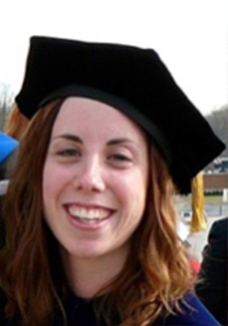 Kathryn's research focused on the role of the TrxSR two-component regulatory system in the regulation of virulence of the Gram-positive group A streptococcus (GAS), a strict human pathogen. Using genome-wide transcriptome studies, Kathryn was able to establish that TrxR activates transcription of Mga-regulated virulence genes, a separate non-TCS regulatory pathway controlling factors important for immune evasion and colonization. TrxSR appears to directly regulate the Mga virulence regulon independent of phosphorelay its conservation in other serotypes suggests a conserved role for its involvement in virulence regulation in GAS. Kathryn's also contributed to a collaborative project looking at the global metal-dependent regulator MtsR and its contribution to virulence in GAS. For her work, Kathryn was awarded the Moyer Award for the most outstanding graduate student in the 3 molecular graduate programs for 2011. After defending her Ph.D., Kathryn was an ORISE postdoctoral fellow at the FDA in Washington, DC before moving to the EPA in North Carolina working on decontamination of spores following major biological incidents.
Kathryn's research focused on the role of the TrxSR two-component regulatory system in the regulation of virulence of the Gram-positive group A streptococcus (GAS), a strict human pathogen. Using genome-wide transcriptome studies, Kathryn was able to establish that TrxR activates transcription of Mga-regulated virulence genes, a separate non-TCS regulatory pathway controlling factors important for immune evasion and colonization. TrxSR appears to directly regulate the Mga virulence regulon independent of phosphorelay its conservation in other serotypes suggests a conserved role for its involvement in virulence regulation in GAS. Kathryn's also contributed to a collaborative project looking at the global metal-dependent regulator MtsR and its contribution to virulence in GAS. For her work, Kathryn was awarded the Moyer Award for the most outstanding graduate student in the 3 molecular graduate programs for 2011. After defending her Ph.D., Kathryn was an ORISE postdoctoral fellow at the FDA in Washington, DC before moving to the EPA in North Carolina working on decontamination of spores following major biological incidents.
| Year of Entry (Prior Degree and Institution) | 2006 (B.S. Syracuse Univ.) |
|---|---|
| Mentor-Dept (Grad program) | McIver-CBMG (CBMG) |
| Time on Training Grant | Sep. 2010 to Aug. 2011 |
| Title of Research Project | The TrxSR Two-Component Signal Transduction System and its Role in GAS Virulence Regulation |
| Publications | |
| Presentations | |
| Awards and Fellowships | |
| Degree Received (Year) | Ph.D. (2011) |
| Post Degree Positions (Grant Support) |
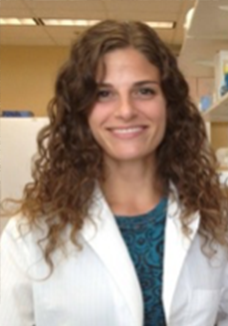 Heather's dissertation work aimed to understand regulatory macrophages that down-regulate the production of inflammatory cytokines and increase their production of anti-inflammatory cytokines, making them potent immunoregulatory cells. She demonstrated that upon stimulation, macrophages rapidly produce and secrete ATP and catabolize it to adenosine to control their own activation state. Heather’s work has important implications for therapeutic interventions based on the induction of regulatory macrophages. Her work resulted in several high impact first-author publications in Blood and Journal of Leukocyte Biology. For her work, Heather was awarded the Moyer Award for the most outstanding graduate student in the 3 molecular graduate programs for 2014 and the “President’s Award” given by the Society for Leukocyte Biology to the most outstanding presentation from a graduate student or postdoctoral fellow at their annual meeting in Maui Hawaii. Since defending her Ph.D. earlier this year, Heather is doing a postdoctoral fellowship in the ImmunoOncology section at EMD Serono Research & Development (subsidiary of Merck) located outside Boston, MA.
Heather's dissertation work aimed to understand regulatory macrophages that down-regulate the production of inflammatory cytokines and increase their production of anti-inflammatory cytokines, making them potent immunoregulatory cells. She demonstrated that upon stimulation, macrophages rapidly produce and secrete ATP and catabolize it to adenosine to control their own activation state. Heather’s work has important implications for therapeutic interventions based on the induction of regulatory macrophages. Her work resulted in several high impact first-author publications in Blood and Journal of Leukocyte Biology. For her work, Heather was awarded the Moyer Award for the most outstanding graduate student in the 3 molecular graduate programs for 2014 and the “President’s Award” given by the Society for Leukocyte Biology to the most outstanding presentation from a graduate student or postdoctoral fellow at their annual meeting in Maui Hawaii. Since defending her Ph.D. earlier this year, Heather is doing a postdoctoral fellowship in the ImmunoOncology section at EMD Serono Research & Development (subsidiary of Merck) located outside Boston, MA.
| Year of Entry (Prior Degree and Institution) | 2008 (B.S. Univ. Minnesota) |
|---|---|
| Mentor-Dept (Grad program) | Mosser-CBMG (CBMG |
| Time on Training Grant | Jan. 2011 to Dec. 2011 |
| Title of Research Project | The Inhibition of Classical Macrophage Activation by Adenosine |
| Publications | |
| Presentations | |
| Awards and Fellowships | |
| Degree Received (Year) | Ph.D. (2014) |
| Post Degree Positions (Grant Support) |
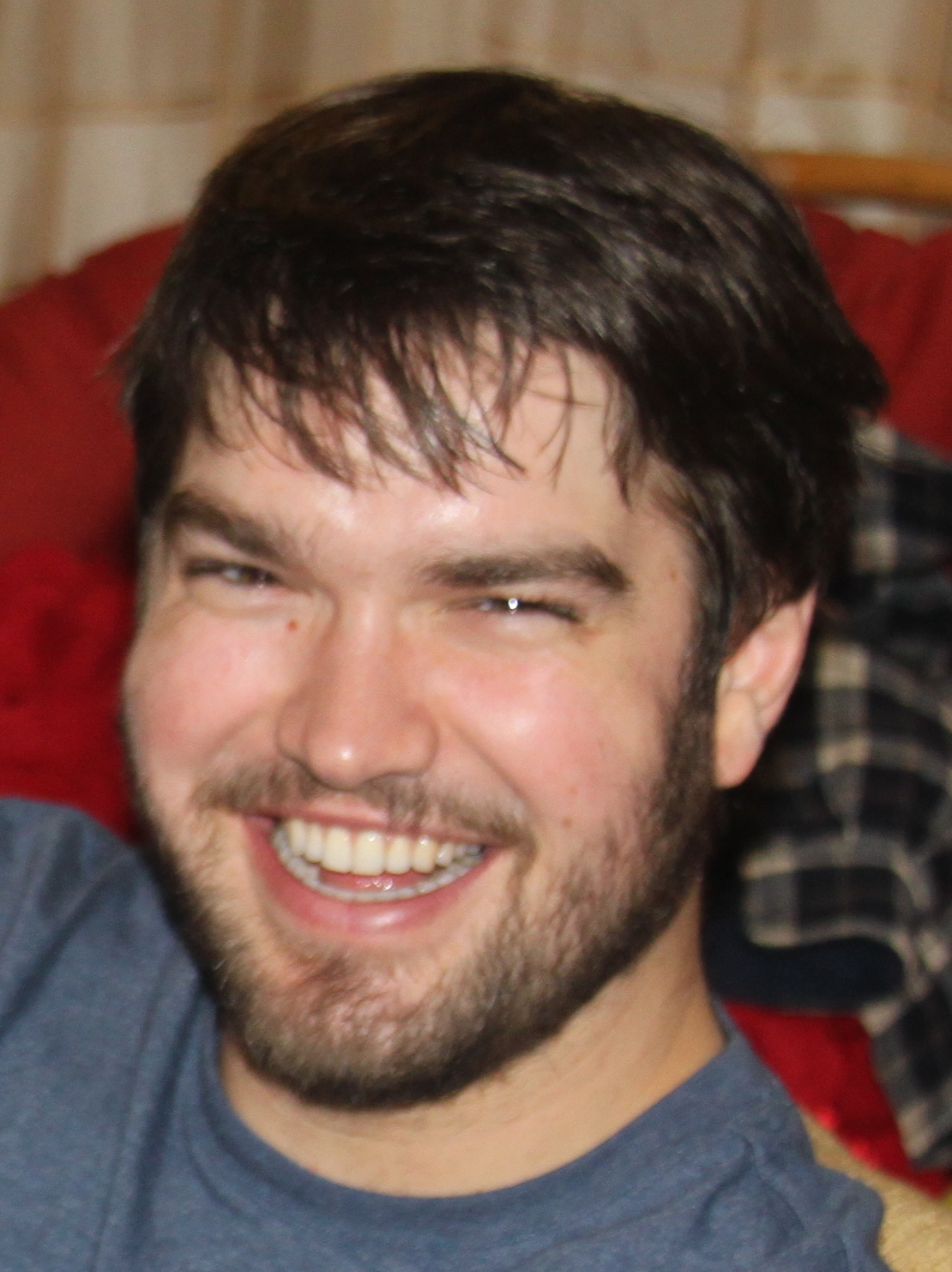 Kevin's research focused on the bacterial second messenger cyclic-di-GMP (cdiGMP) that has become a target of intensive study due to its ubiquitous regulation of bacterial virulence phenotypes. In the opportunistic pathogen P. aeruginosa, Kevin helped develop a high-throughput binding assay termed differential radial capillary action of ligand assay (DRaCALA) that is able to detect specific binding of cdiGMP to both purified proteins and whole-cell lysates (WCL). This work resulted in a first-author manuscript in PNAS. In collaboration with Grundling lab in the UK, Kevin helped use DRaCALA to identify cdiAMP binding proteins in Staphylococcus aureus leading to a second PNAS paper. He has now used total ORF libraries of V. cholerae with systematic DRaCALA to identify cdiGMP binding proteins on a whole genome scale and this work is in preparation for publication. For his work, Kevin was awarded the Moyer Award for the most outstanding graduate student in the 3 molecular graduate programs for 2013, the third of our trainees to win the highly competitive and prestigious award. After defending in spring of 2014, Kevin is currently doing a postdoctoral fellowship with Laurie Comstock at the Channing Laboratories and Harvard University in Boston, MA.
Kevin's research focused on the bacterial second messenger cyclic-di-GMP (cdiGMP) that has become a target of intensive study due to its ubiquitous regulation of bacterial virulence phenotypes. In the opportunistic pathogen P. aeruginosa, Kevin helped develop a high-throughput binding assay termed differential radial capillary action of ligand assay (DRaCALA) that is able to detect specific binding of cdiGMP to both purified proteins and whole-cell lysates (WCL). This work resulted in a first-author manuscript in PNAS. In collaboration with Grundling lab in the UK, Kevin helped use DRaCALA to identify cdiAMP binding proteins in Staphylococcus aureus leading to a second PNAS paper. He has now used total ORF libraries of V. cholerae with systematic DRaCALA to identify cdiGMP binding proteins on a whole genome scale and this work is in preparation for publication. For his work, Kevin was awarded the Moyer Award for the most outstanding graduate student in the 3 molecular graduate programs for 2013, the third of our trainees to win the highly competitive and prestigious award. After defending in spring of 2014, Kevin is currently doing a postdoctoral fellowship with Laurie Comstock at the Channing Laboratories and Harvard University in Boston, MA.
| Year of Entry (Prior Degree and Institution) | 2008 (B.S. College of William & Mary) |
|---|---|
| Mentor-Dept (Grad program) | Lee-CBMG (CBMG) |
| Time on Training Grant | Jan. 2011 to Dec. 2011 |
| Title of Research Project | Discovery and Characterization of c-di-GMP Receptors |
| Publications | |
| Presentations | |
| Awards and Fellowships | |
| Degree Received (Year) | Ph.D. (2014) |
| Post Degree Positions (Grant Support) |
 Sonja's research in the Sintim lab was geared to find small molecule antagonists for bacterial quorum sensing (QS) mediated by the “universal” QS autoinducer, AI-2. She synthesized an expanded and diverse array of AI-2 analogs were able to disrupt AI-2 signaling in Escherichia coli, Salmonella typhimurium as well as disrupt quorum sensing (QS) behaviors in Pseudomonas aeruginosa. Sonja was able to demonstrate that these analogs could selectively antagonize QS in single bacterial strains in a physiologically relevant polymicrobial culture. Although she was in the middle of a highly productive and successful doctoral career, Sonja made the personal decision to obtain an MS degree for family reasons. After a maternity leave, Sonja has been lecturing at the College of Southern Maryland and now at Northern Virginia Community College. In addition, she is co-founder and publisher of an online magazine called MoDive.
Sonja's research in the Sintim lab was geared to find small molecule antagonists for bacterial quorum sensing (QS) mediated by the “universal” QS autoinducer, AI-2. She synthesized an expanded and diverse array of AI-2 analogs were able to disrupt AI-2 signaling in Escherichia coli, Salmonella typhimurium as well as disrupt quorum sensing (QS) behaviors in Pseudomonas aeruginosa. Sonja was able to demonstrate that these analogs could selectively antagonize QS in single bacterial strains in a physiologically relevant polymicrobial culture. Although she was in the middle of a highly productive and successful doctoral career, Sonja made the personal decision to obtain an MS degree for family reasons. After a maternity leave, Sonja has been lecturing at the College of Southern Maryland and now at Northern Virginia Community College. In addition, she is co-founder and publisher of an online magazine called MoDive.
| Year of Entry (Prior Degree and Institution) | 2009 (B.S. Towson Univ., Georgia Tech) |
|---|---|
| Mentor-Dept (Grad program) | Sintim-Chem/Biochem (Biochemistry) |
| Time on Training Grant | Sep. 2011 to Aug. 2012 |
| Title of Research Project | Synthesis and Evaluation of C1 Alkyl AI-2 analogs for the Inhibition of Quorum Sensing in Enteric Bacteria |
| Publications | |
| Presentations | |
| Awards and Fellowships | Chem/Biochem Diversity Fellowship, 2010-2011 |
| Degree Received (Year) | M.S. (2011) |
| Post Degree Positions (Grant Support) |
 Beki's research involved the parasites of the Leishmania spp. that cause a spectrum of diseases known as leishmaniasis, that range from self-healing cutaneous lesions (L. amazonensis) to lethal visceral disease (L. chagasi). Since Leishmania spp. must acquire and transport heme, an essential cofactor for numerous enzymes and cellular pathways, Beki's dissertation project was to help characterize the molecular mechanisms involved in this critical process. She was able to show in collaboration with the Hamza lab (also a trainer on this T32) that a membrane protein encoded by the Leishmania Heme Response 1 gene (LHR1) is responsible for uptake of heme from the environment as well as for successful infection of mammalian cells. Her work was recognized at the ASM General Meeting in 2012 as a finalist for the competitive Finkelstein Award in Microbial Pathogenesis and receipt of an Outstanding Poster Travel Award. After defending last month, Beki is finishing up her structure/function analysis of LHR1 protein as a research associate for a first-author manuscript submission prior to leaving for a postdoctoral fellowship this fall.
Beki's research involved the parasites of the Leishmania spp. that cause a spectrum of diseases known as leishmaniasis, that range from self-healing cutaneous lesions (L. amazonensis) to lethal visceral disease (L. chagasi). Since Leishmania spp. must acquire and transport heme, an essential cofactor for numerous enzymes and cellular pathways, Beki's dissertation project was to help characterize the molecular mechanisms involved in this critical process. She was able to show in collaboration with the Hamza lab (also a trainer on this T32) that a membrane protein encoded by the Leishmania Heme Response 1 gene (LHR1) is responsible for uptake of heme from the environment as well as for successful infection of mammalian cells. Her work was recognized at the ASM General Meeting in 2012 as a finalist for the competitive Finkelstein Award in Microbial Pathogenesis and receipt of an Outstanding Poster Travel Award. After defending last month, Beki is finishing up her structure/function analysis of LHR1 protein as a research associate for a first-author manuscript submission prior to leaving for a postdoctoral fellowship this fall.
| Year of Entry (Prior Degree and Institution) | 2008 (B.S. Brigham Young Univ.) |
|---|---|
| Mentor-Dept (Grad program) | Andrews-CBMG (CBMG) |
| Time on Training Grant | Jan. 2012 to Jul. 2013 |
| Title of Research Project | Characterizing the role of Heme in disease outcomes of Leishmania infections |
| Publications | |
| Presentations | Renberg, R.L., Huynh, C., Yuan, X., Miguel, M.C., Potchenko, O., Philpott, C.C., Hamza, I. and Andrews, N.W. (2012) Leishmania LHR1 mediates mediates heme acquisition. ASM General Meeting, New Orleans, LA (POSTER). Renberg, R.L., Huynh, C., Yuan, X., Miguel, M.C., Potchenko, O., Philpott, C.C., Hamza, I. and Andrews, N.W. (2012) Leishmania LHR1 mediates mediates heme acquisition. Graduate Research Interactions Day, College Park, MD (POSTER). Renberg, R.L., Huynh, C., Yuan, X., Miguel, M.C., Potchenko, O., Philpott, C.C., Hamza, I. and Andrews, N.W. (2013) Leishmania LHR1 mediates mediates heme acquisition. UMB-UMCP CrossTalk Symposium on Host-Pathogen Interactions, Baltimore, MD (TALK) |
| Awards and Fellowships | |
| Degree Received (Year) | Ph.D. (2015) |
| Post Degree Positions (Grant Support) | Research Scientist, U.S. Army Research Laboratories, Adelphi, MD |
Mandy's doctoral work in the Stein lab combined bacterial pathogenesis, vaccine development, and carbohydrate biochemistry to prepare and characterize glycan-functionalized catanionic surfactant vesicles as a platform for glycan synthesis, and to demonstrate that the resulting glycan-functionalized vesicles serve as a scaffold for the interrogation of protein-glycan interactions. Mandy optimized a high-yield method for the purification of N. gonorrhoeae lipooligosaccharide (LOS) glycosyltransferase LgtE, an enzyme that catalyzes the addition of galactose onto a terminal glucose found on LOS, to show that surfactant vesicles facilitate the purification of insoluble species. She developed a novel method exploiting differential lectin binding to demonstrate LgtE activity on whole cell bacteria and on catanionic vesicles functionalized with LOS or a synthetic glycolipid acceptor substrate. Mandy's dissertation work provided proof-of-concept that glycan-functionalized catanionic vesicles can be used to create a high-specificity and high-throughput glycan array with applications in many fields of glycomics. After working with bacterial pathogens and vaccine development, Mandy decided to obtain and MD after her PhD defense this summer, and is now in her first year of medical school at the University of Maryland School of Medicine in Baltimore.
| Year of Entry (Prior Degree and Institution) | 2008 (Queens Univ.) |
|---|---|
| Mentor-Dept (Grad program) | Stein-CBMG (Biochemistry) |
| Time on Training Grant | Jan. 2012 to Dec. 2012 |
| Title of Research Project | Utilization of Functionalized Surfactant Vessicles to Investigate Protein-Glycan Interactions of N. gonorrhoeae |
| Publications | |
| Presentations | Mahle, A.C. and Stein, D.C. (2012). Utilization of functionalized surfactant vesicles to investigate protein-glycan interactions. UMB-UMCP CrossTalk Symposium on Host-Pathogen Interactions, Shady Grove, MD (TALK) Mahle, A.C. and Stein, D.C. (2012). Utilization of functionalized surfactant vesicles to investigate protein-glycan interactions. UMCP CBMG Research In Progress: (TALK) Mahle, A.C., Park, J., DeShong, P., and Stein, D.C. (2013). Utilization of functionalized surfactant vesicles to investigate protein-glycan interactions. Mid-Atlantic Microbial Pathogenesis Meeting, Wintergreen, VA (POSTER). |
| Awards and Fellowships | |
| Degree Received (Year) | Ph.D. (2013) |
| Post Degree Positions (Grant Support) | 3rd Year MD Student, Pediatric Gastrenterology, Univ. of Maryland School of Medicine, Baltimore, MD |
Mona Wu Orr, Ph.D. (Supported Aug. 2012 - Jul. 2013; Mentor: Dr. Vincent Lee, Ph.D.)
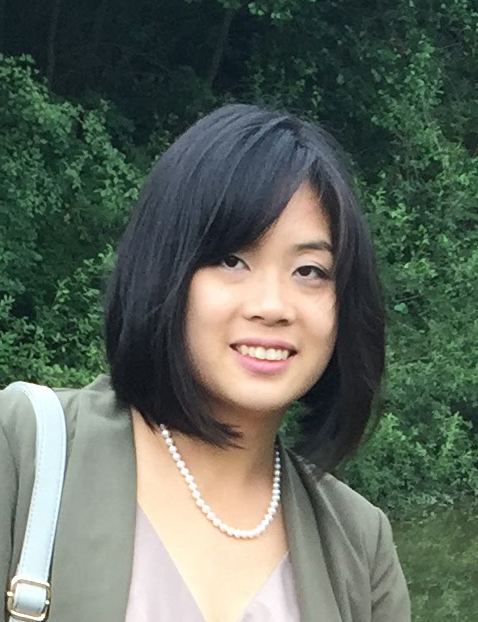 Mona's dissertation research looks at the role of pGpG, the linear degradation product of the ubiquitous bacterial nucleotide second messenger, c-di-GMP, on medically relevant phenotypes in Gram-negative human pathogens. She has found that oligoribonuclease, an RNase, is capable of degrading pGpG, and she has completed a screen for novel pGpG binding proteins in a Vibrio cholerae ORF library. This work was presented at poster at the International Meeting on Cyclic-di-GMP in Berlin, Germany, Microbial Pathogenesis and Host Response Meeting at Cold Spring Harbor Laboratory, and the Gordon Research Conference on Microbial Toxins. Her poster was awared the best poster at the International Meeting on Cyclic-di-GMP as it represents a major shift in the understanding of cyclic dinucleotide signaling. In addition to her own studies, Mona contributed to many additional publications. Since graduation, Mona has completed her post-doctoral fellowship with Dr. Gisela Storz at the National Institutes of Health (NIH). In 2020, Mona started as an Assistant Professor at Amherst College.
Mona's dissertation research looks at the role of pGpG, the linear degradation product of the ubiquitous bacterial nucleotide second messenger, c-di-GMP, on medically relevant phenotypes in Gram-negative human pathogens. She has found that oligoribonuclease, an RNase, is capable of degrading pGpG, and she has completed a screen for novel pGpG binding proteins in a Vibrio cholerae ORF library. This work was presented at poster at the International Meeting on Cyclic-di-GMP in Berlin, Germany, Microbial Pathogenesis and Host Response Meeting at Cold Spring Harbor Laboratory, and the Gordon Research Conference on Microbial Toxins. Her poster was awared the best poster at the International Meeting on Cyclic-di-GMP as it represents a major shift in the understanding of cyclic dinucleotide signaling. In addition to her own studies, Mona contributed to many additional publications. Since graduation, Mona has completed her post-doctoral fellowship with Dr. Gisela Storz at the National Institutes of Health (NIH). In 2020, Mona started as an Assistant Professor at Amherst College.
| Year of Entry (Prior Degree and Institution) | 2010 B.S. Johns Hopkins Univ. |
|---|---|
| Mentor-Dept (Grad program) | Lee-CBMG (MOCB-BISI) |
| Time on Training Grant | Aug. 2012 to Jul. 2013 |
| Title of Research Project | Characterization of pGpG as a Signaling Molecule in Bacterial Pathogens |
| Publications | Orr MW, Weiss CA, Severin GB, Turdiev H, Kim SK, Turdiev A, Liu K, Tu BP, Waters CM, Winkler WC, Lee VT. (2018) A Subset of Exoribonucleases Serve as Degradative Enzymes for pGpG in c-di-GMP Signaling. J Bacteriol. 200(24):e00300-18. PMID: 30249708. Orr MW, Lee VT. (2017) Differential Radial Capillary Action of Ligand Assay (DRaCALA) for High-Throughput Detection of Protein-Metabolite Interactions in Bacteria. Methods Mol Biol. 1535:25-41. PMID: 27914071 Hendrick WA, Orr MW, Murray SR, Lee VT, Melville SB. (2017) Cyclic Di-GMP Binding by an Assembly ATPase (PilB2) and Control of Type IV Pilin Polymerization in the Gram-Positive Pathogen Clostridium perfringens. J Bacteriol. 199(10):e00034-17. PMID: 28242722 Orr MW, Galperin MY, Lee VT. (2016) Sustained sensing as an emerging principle in second messenger signaling systems. Curr Opin Microbiol. 34:119-126. PMID: 27700990 Orr MW, Lee VT. (2016) A PilZ domain protein for chemotaxis adds another layer to c-di-GMP-mediated regulation of flagellar motility. Sci Signal. 9(450):fs16. PMID: 27811181 Roelofs KG, Jones CJ, Helman SR, Shang X, Orr MW, Goodson JR, Galperin MY, Yildiz FH, Lee VT. (2015) Systematic Identification of Cyclic-di-GMP Binding Proteins in Vibrio cholerae Reveals a Novel Class of Cyclic-di-GMP-Binding ATPases Associated with Type II Secretion Systems. PLoS Pathog. 11(10):e1005232. PMID: 26506097 Orr MW, Donaldson GP, Severin GB, Wang J, Sintim HO, Waters CM, Lee VT. (2015) Oligoribonuclease is the primary degradative enzyme for pGpG in Pseudomonas aeruginosa that is required for cyclic-di-GMP turnover. Proc Natl Acad Sci U S A. 112(36):E5048-57. PMID: 26305945 Cole SJ, Records AR, Orr MW, Linden SB, Lee VT. (2014) Catheter-associated urinary tract infection by Pseudomonas aeruginosa is mediated by exopolysaccharide-independent biofilms. Infect Immun. 82(5):2048-58. PMID: 24595142 Lieberman OJ, Orr MW, Wang Y, Lee VT. (2014) High-throughput screening using the differential radial capillary action of ligand assay identifies ebselen as an inhibitor of diguanylate cyclases. ACS Chem Biol 9(1):183-92. PMID: 24134695 |
| Presentations | Orr, M.W., Roelofs, K.G., Lee, V.T., Stewart, R.C. (2013) Intracellular cAMP levels affect bacterial chemotaxis response by inhibiting CheA. Mid-Atlantic Microbial Pathogenesis Meeting, Wintergreen, VA. (POSTER) Orr MW, Donaldson GP, Lee VT. (2013) More Than a Degradation Product: A Regulatory Role for pGpG. UMB/UMCP CrossTalk Symposium on Host-Pathogen Interactions, Baltimore, MD. (TALK) Orr MW, Donaldson GP, Lee VT. (2013) More Than a Degradation Product: A Regulatory Role for pGpG. Cold Spring Harbor Microbial Pathogenesis and Host Response Meeting, Cold Spring Harbor, NY. (POSTER) |
| Awards and Fellowships | |
| Degree Received (Year) | Ph.D. (2016) |
| Post Degree Positions (Grant Support) | Postdoctoral Fellow ,Dr. Gisela Storz, National Institutes of Health, Bethesda, MD Assistant Professor at Amherst College |
Sayed Zaheer (Jan. 2013 - Dec. 2013; Mentor: Dr. Wade Winkler, Ph.D.)
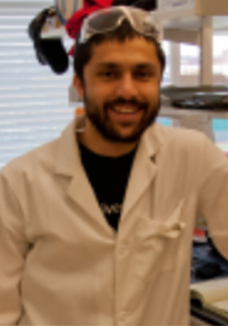 Sayed's (Shanahwaz's) project is to study the structure and function of the M-box RNA involved in manganese (Mg2+) sensing and explore whether it could be used as a sensor for live cell imaging of magnesium dynamics in vivo using Bacillus subtilis endosporulation as a model bacterial system for spore-forming pathogens. He has been able to demonstrate that riboswitch reporters can be used as novel metabolomic tools for examining spatial and temporal fluctuations of metabolites or metal ions in bacteria. Shanahwaz is currently continuing these investigations to further reveal the cation’s role in spore formation and its mechanism of transport from mother cell to forespore. In the future, he plans to utilize these Mg+2-sensing genetic reporters to study the Mg+2 fluctuations during bacterial pathogenesis. This data was presented as a talk at the 2013 CrossTalk Symposium on Host-Pathogen Interaction in Baltimore, MD, and two manuscripts have been submitted.
Sayed's (Shanahwaz's) project is to study the structure and function of the M-box RNA involved in manganese (Mg2+) sensing and explore whether it could be used as a sensor for live cell imaging of magnesium dynamics in vivo using Bacillus subtilis endosporulation as a model bacterial system for spore-forming pathogens. He has been able to demonstrate that riboswitch reporters can be used as novel metabolomic tools for examining spatial and temporal fluctuations of metabolites or metal ions in bacteria. Shanahwaz is currently continuing these investigations to further reveal the cation’s role in spore formation and its mechanism of transport from mother cell to forespore. In the future, he plans to utilize these Mg+2-sensing genetic reporters to study the Mg+2 fluctuations during bacterial pathogenesis. This data was presented as a talk at the 2013 CrossTalk Symposium on Host-Pathogen Interaction in Baltimore, MD, and two manuscripts have been submitted.
| Year of Entry (Prior Degree and Institution) | 2011 B.S. Univ. of Chicago |
|---|---|
| Mentor-Dept (Grad program) | Winkler-CBMG (Biochemistry) |
| Time on Training Grant | Jan. 2013 to Dec. 2013 |
| Title of Research Project | Basis of Metal Binding and Signal Transduction of the “M-box” Riboswitch |
| Publications | |
| Presentations | Zaheer, SS, Goodson, J, and Winkler, WC (2013) More than just a degradation product: A regulatory role for pGpG, CrossTalk Symposium on Host-Pathogen Interactions, Baltimore, MD. (TALK) |
| Awards and Fellowships | |
| Degree Received (Year) | |
| Post Degree Positions (Grant Support) | Leave of Absence |
Ashley Nazario-Toole, Ph.D. (Aug. 2013 - Jul. 2014; Mentor: Dr. Louisa Wu, Ph.D.):
 Ashley is investigating the cellular immune response in the model organism Drosophila melanogaster. Phagocytosis of bacteria by immune surveillance cells, known as hemocytes, is a key component of this innate immune response. Ashley aims to identify new genes and signaling pathways involved in phagocytosis of bacterial pathogens using a combination of Genome-Wide Association Studies (GWAS), classical genetics, and molecular and cellular biology approaches. Using RNAi in hemocytes as well as lines carrying mutant alleles, she has found that loss of A2bp1 leads to reduced phagocytosis coupled decreased resistance toS. aureus infection. Ultimately, the goal of Ashley’s work is to enhance our understanding of innate immune processes that mediate bacterial resistance in flies and humans.
Ashley is investigating the cellular immune response in the model organism Drosophila melanogaster. Phagocytosis of bacteria by immune surveillance cells, known as hemocytes, is a key component of this innate immune response. Ashley aims to identify new genes and signaling pathways involved in phagocytosis of bacterial pathogens using a combination of Genome-Wide Association Studies (GWAS), classical genetics, and molecular and cellular biology approaches. Using RNAi in hemocytes as well as lines carrying mutant alleles, she has found that loss of A2bp1 leads to reduced phagocytosis coupled decreased resistance toS. aureus infection. Ultimately, the goal of Ashley’s work is to enhance our understanding of innate immune processes that mediate bacterial resistance in flies and humans.
| Year of Entry (Prior Degree and Institution) | 2011 (B.S. Coll. of Charleston M.S. UT San Antonio) |
|---|---|
| Mentor-Dept (Grad program) | Wu-CBMG (MOCB-BISI) |
| Time on Training Grant | Aug. 2013 to Jul. 2014 |
| Title of Research Project | SNPs Important for Phagocytosis in the Innate Immunity of Drosophila melanogaster |
| Publications | |
| Presentations | Nazario-Toole, A.E., McCord, R.P., Zhang, H., Chines, P.S., Zhan, Erdos, M.R., Collins, F.S., Dekker, J. and Cao, K. (2013) Correlated alterations in genome organization, histone methylation, and DNA–lamin A/C interactions in Hutchinson-Gilford progeria syndrome. University of Maryland Graduate Interaction Day (GRID), 2011 (TALK) Nazario-Toole A.E. and Wu, L.P. (2014) Correlated alterations in genome organization, histone methylation, and DNA–lamin A/C interactions in Hutchinson-Gilford progeria syndrome. |
| Awards and Fellowships | |
| Degree Received (Year) | Ph.D. (2016) |
| Post Degree Positions (Grant Support) | Postdoctoral Research, IBBR, University of Maryland, College Park |
Sarah E. Ahlbrand, Ph.D. (Aug. 2013 - Jul. 2014; Mentor: Dr. Volker Briken, Ph.D.):
 rah's research focuses on the intracellular pathogen Mycobacterium tuberculosis (Mtb), which results in approximately 1 million deaths each year. Once inhaled Mtb is phagocytosed by lung alveolar macrophages, where it activates the host immune response. Studies have shown that the pro-inflammatory cytokine IL-1β mediates Mtb clearance and the cleavage and activation of IL-1β in dendritic cells and macrophages is mediated largely by inflammasomes. Sarah and others in the Briken lab have shown that Mtb inhibits the AIM2 inflammasome in an ESX-1-dependent manner, suggesting a secreted effector is involved in this process. They have also shown that Mtb inhibits IFNβ production and signaling, which could provide a potential indirect mechanism for AIM2 inhibition by Mtb. Her ongoing dissertation work aims to characterize the specific mechanisms Mtb employs to inhibit these various pathways, thus providing a better understanding of this novel form of innate immune system manipulation during Mtb infection. Sarah has already contributed to a manuscript and two review articles in only 2 years. She was successful in obtaining a highly prestigious NSF pre-doctoral fellowship for her remaining time in the program that began just after her 12 months on this T32 award.
rah's research focuses on the intracellular pathogen Mycobacterium tuberculosis (Mtb), which results in approximately 1 million deaths each year. Once inhaled Mtb is phagocytosed by lung alveolar macrophages, where it activates the host immune response. Studies have shown that the pro-inflammatory cytokine IL-1β mediates Mtb clearance and the cleavage and activation of IL-1β in dendritic cells and macrophages is mediated largely by inflammasomes. Sarah and others in the Briken lab have shown that Mtb inhibits the AIM2 inflammasome in an ESX-1-dependent manner, suggesting a secreted effector is involved in this process. They have also shown that Mtb inhibits IFNβ production and signaling, which could provide a potential indirect mechanism for AIM2 inhibition by Mtb. Her ongoing dissertation work aims to characterize the specific mechanisms Mtb employs to inhibit these various pathways, thus providing a better understanding of this novel form of innate immune system manipulation during Mtb infection. Sarah has already contributed to a manuscript and two review articles in only 2 years. She was successful in obtaining a highly prestigious NSF pre-doctoral fellowship for her remaining time in the program that began just after her 12 months on this T32 award.
| Year of Entry (Prior Degree and Institution) | 2012 B.S. Roanoke College |
|---|---|
| Mentor-Dept (Grad program) | Briken-CBMG (MOCB-BISI) |
| Time on Training Grant | Aug. 2013 to Jul. 2014 |
| Title of Research Project | Characterizing Inhibition Mechanisms of the Host Cell AIM2 Inflammasome by Mycobacterium tuberculosis |
| Publications | Shah, S., Bohsali, A., Ahlbrand, S.E., Srinivasan, L., Rathinam, V.A., Vogel, S.N., Fitzgerald, K.A., Sutterwala, F.S., Briken, V. (2013) Cutting edge: Mycobacterium tuberculosis but not nonvirulent mycobacteria inhibits IFN-β and AIM2 inflammasome-dependent IL-1β production via its ESX-1 secretion system. Journal of Immunology.191(7):3514-8. doi: 10.4049/jimmunol.130133; PMID: 23997220. Briken, V., Ahlbrand, S.E., Shah, S. (2013) Mycobacterium tuberculosis and the host cell inflammasome: a complex relationship. Frontiers in Cell Infection & Microbiology.3:62. doi: 10.3389/fcimb.2013.00062. PubMed PMID: 24130966 Srinivasan, L., Ahlbrand, S.E., Briken, V. (2014) Interaction of Mycobacterium tuberculosis with host cell death pathways. Cold Spring Harb Perspect Med. 4(8). PubMed PMID: 24968864 Sigwalt, D, Ahlbrand, SE, Xhang, M, Vinciguerra, B, Briken, V, and Isaacs L (2015) Organic Letters, 17(3):5014-5917. |
| Presentations | Ahlbrand, SE, Shah, S, Sutterwala, FS, and Briken, V (2013) Characterizing the inhibition of the host AIM2 inflammasome by Mycobacterium tuberculosis, CrossTalk Symposium on Host-Pathogen Interactions, Shady Grove MD. (TALK) |
| Awards and Fellowships | |
| Degree Received (Year) | Ph.D. (2018) |
| Post Degree Positions (Grant Support) | NSF Pre-doctoral Fellow |
Ganesh Sundar (Jan. 2014 - Dec. 2014; Mentor: Dr. Kevin McIver, Ph.D.)
 Ganesh's (Surya's) project involves a human-restricted pathogen, the Group A Streptococcus (GAS). GAS relies on the phosphoenolpyruvate-dependent phosphotransferase system (PTS) for the metabolism of various carbohydrate sources during infection; a system comprised of two general enzymes, EI and Hpr, and 14 sugar specific EIIs. The roles of the general PTS enzymes have been extensively studied, but the contibution of the individual EIIs are still unknown. Surya's dissertation work seeks to resolve the importance of sugar-specific EIIs in Group A Streptococcus pathogenesis. He has constructed mutants in each of the 14 EII genes and is characterizing their phenotypes focusing on fructose, mannose, and glucose utilization; all of which have been associated with disease-related environment such as blood. Surya will interrogate the role of these systems during infection using various animal models to determine what carbohydrates are utilized at various niches in the host.
Ganesh's (Surya's) project involves a human-restricted pathogen, the Group A Streptococcus (GAS). GAS relies on the phosphoenolpyruvate-dependent phosphotransferase system (PTS) for the metabolism of various carbohydrate sources during infection; a system comprised of two general enzymes, EI and Hpr, and 14 sugar specific EIIs. The roles of the general PTS enzymes have been extensively studied, but the contibution of the individual EIIs are still unknown. Surya's dissertation work seeks to resolve the importance of sugar-specific EIIs in Group A Streptococcus pathogenesis. He has constructed mutants in each of the 14 EII genes and is characterizing their phenotypes focusing on fructose, mannose, and glucose utilization; all of which have been associated with disease-related environment such as blood. Surya will interrogate the role of these systems during infection using various animal models to determine what carbohydrates are utilized at various niches in the host.
| Year of Entry (Prior Degree and Institution) | 2012 (B.S. Coll. of William & Mary) |
|---|---|
| Mentor-Dept (Grad program) | McIver-CBMG (MOCB-BISI) |
| Time on Training Grant | Jan. 2014 to Dec. 2014 |
| Title of Research Project | Carbohydrate metabolism and virulence in the human pathogen Streptococcus pyogenes |
| Publications | |
| Presentations | |
| Awards and Fellowships | |
| Degree Received (Year) | Ph.D. (2017) |
| Post Degree Positions (Grant Support) | (RA) |
Margo Gebbie (Aug. 2014 - Jul. 2015; Mentor: Dr. Wade Winkler, Ph.D.)
 Margo's research looks at Adenosyl cobalamine (AdoCbl) that is required for the metabolism of ethanolamine (EA) in Enterococcus faecalis, both as an enzyme co-factor and for the induction of the EA utilization (eut) genes. It acts through an AdoCbl-binding riboswitch to induce the eut genes, but the mechanism of control is incompletely understood. Margo and collaborators at UT Houston (Garsin lab) found that the AdoCbl-binding riboswitch is part of a small, trans-acting RNA, EutX, which additionally contains a dual hairpin substrate for EutV. In the absence of AdoCbl, EutX sequesters EutV in an inactive complex. When AdoCbl is present, its binding to the riboswitch prevents EutX/EutV complex formation, and EutV is free to induce gene expression by antitermination. These results expand the known types of small RNA regulatory mechanisms to include riboswitch-mediated sequestration of RNA-binding regulatory proteins and were recently published in Science.
Margo's research looks at Adenosyl cobalamine (AdoCbl) that is required for the metabolism of ethanolamine (EA) in Enterococcus faecalis, both as an enzyme co-factor and for the induction of the EA utilization (eut) genes. It acts through an AdoCbl-binding riboswitch to induce the eut genes, but the mechanism of control is incompletely understood. Margo and collaborators at UT Houston (Garsin lab) found that the AdoCbl-binding riboswitch is part of a small, trans-acting RNA, EutX, which additionally contains a dual hairpin substrate for EutV. In the absence of AdoCbl, EutX sequesters EutV in an inactive complex. When AdoCbl is present, its binding to the riboswitch prevents EutX/EutV complex formation, and EutV is free to induce gene expression by antitermination. These results expand the known types of small RNA regulatory mechanisms to include riboswitch-mediated sequestration of RNA-binding regulatory proteins and were recently published in Science.
| Year of Entry (Prior Degree and Institution) | 2011 (B.S. SUNY, Albany) |
|---|---|
| Mentor-Dept (Grad program) | Winkler-CBMG (Biochemistry) |
| Time on Training Grant | Aug. 2014 to Jul. 2015 |
| Title of Research Project | Post-initiation RNA regulation of ethanolamine utilization in Enterococcus faecalis |
| Publications | |
| Presentations | Gebbie, MP, Debroy, S, Ramesh, A, Goodson, J, Cruz, M, van Hoof, A, Winkler, W, and Darsin, D (2014) A riboswitch-containing sRNA controls gene expression by sequestration of a response regulator, RiboClub Annual Meeting, Quebec, Canada (TALK) |
| Awards and Fellowships | Jacob Goldhaber Travel Award (2014) |
| Degree Received (Year) | Ph.D. (2017) |
| Post Degree Positions (Grant Support) | (RA) |
James I. Andorko (Aug. 2014 - Jul. 2015; Mentor: Dr. Christopher Jewell, Ph.D.)
 Jim's research seeks to link the physicochemical properties of biomaterial vaccine carriers to alterations in the structure and function of lymph nodes (LNs) – tissues that coordinate immunity. This knowledge will reveal how properties that are preserved across vaccine carriers, adjuvants, and pathogens can cause the activation or suppression of immunity by altering LNs. Jim's approach involves synthesizing polymers that will be used to treat cells or animals in absence or in combination with antigens, adjuvants, or pathogens, using direct‐lymph node injection. His work focuses on three areas:iIn vitro dendritic cell (DC) activation, reorganization of the LN microenvironment, and the role of vaccine carriers during infectiono immunize mice prior to or after challenging with Francisella tularensis Live Vaccine Strain (LVS). Jims work hopes to contrast the local organization of LNs during infection with and without vaccination, and reveal how polymers with specific physicochemical properties injected in LNs polarize systemic response against NIH priority pathogens.
Jim's research seeks to link the physicochemical properties of biomaterial vaccine carriers to alterations in the structure and function of lymph nodes (LNs) – tissues that coordinate immunity. This knowledge will reveal how properties that are preserved across vaccine carriers, adjuvants, and pathogens can cause the activation or suppression of immunity by altering LNs. Jim's approach involves synthesizing polymers that will be used to treat cells or animals in absence or in combination with antigens, adjuvants, or pathogens, using direct‐lymph node injection. His work focuses on three areas:iIn vitro dendritic cell (DC) activation, reorganization of the LN microenvironment, and the role of vaccine carriers during infectiono immunize mice prior to or after challenging with Francisella tularensis Live Vaccine Strain (LVS). Jims work hopes to contrast the local organization of LNs during infection with and without vaccination, and reveal how polymers with specific physicochemical properties injected in LNs polarize systemic response against NIH priority pathogens.
| Year of Entry (Prior Degree and Institution) | 2012 (B.S, M.S. Drexel University) |
|---|---|
| Mentor-Dept (Grad program) | Jewel-BioE (Bioengineering) |
| Time on Training Grant | Aug. 2014 to Jul. 2015 |
| Title of Research Project | Biomaterial interactions with the Lymph Node Microenvironment |
| Publications |
Andorko, JI, Hess, KL, and Jewell, CM (2015) AAPS Journal, 17(2):323-338. Andorko, JI, Hess, KL, Pineault, KG, and Jewell, CM (2016) Acta Biomaterials, 32:24-34. |
| Presentations | |
| Awards and Fellowships | |
| Degree Received (Year) | Ph.D. (2017) |
| Post Degree Positions (Grant Support) | Senior Scientist, Interius BioTherapeutics, Philadelphia, PA |
Bess E. Dalby (Jan. 2015 - Dec. 2015; Mentor: Dr. David Mosser, Ph.D.)
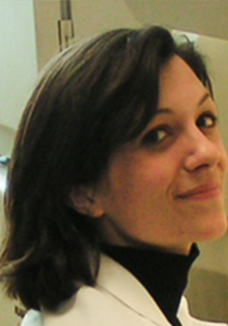 Bess Dalby’s research aims to characterize the genetic expression, transcriptional control and functional relevance of regulatory macrophage activation. Macrophages are phagocytic cells of the innate immune system known primarily for their role in bacterial killing and the initiation of inflammation during infections. However, macrophages are now becoming recognized for diverse roles in wound-healing and the attenuation of immune responses. The Mosser lab previously identified a novel macrophage activation state termed “regulatory” macrophages. These cells are phenotypically distinct from classically activated macrophages, in that they produce low levels of the inflammatory cytokines IL-12, IL-1B and IL-6, but high levels of the anti-inflammatory cytokine IL-10. Bess is currently working in collaboration with MedImmune to increase the understanding of the biology and mechanisms behind macrophage-mediated immunomodulation by generating proteomic and transcriptomic data from regulatory macrophages. Using these datasets, she intends to identify characteristic mRNA markers, membrane proteins, and upstream regulators in these cells. These studies have the potential to provide a global picture of the behavior and function of this phenotype, identify biomarkers specific to regulatory macrophages, and establish their relevance in human disease.
Bess Dalby’s research aims to characterize the genetic expression, transcriptional control and functional relevance of regulatory macrophage activation. Macrophages are phagocytic cells of the innate immune system known primarily for their role in bacterial killing and the initiation of inflammation during infections. However, macrophages are now becoming recognized for diverse roles in wound-healing and the attenuation of immune responses. The Mosser lab previously identified a novel macrophage activation state termed “regulatory” macrophages. These cells are phenotypically distinct from classically activated macrophages, in that they produce low levels of the inflammatory cytokines IL-12, IL-1B and IL-6, but high levels of the anti-inflammatory cytokine IL-10. Bess is currently working in collaboration with MedImmune to increase the understanding of the biology and mechanisms behind macrophage-mediated immunomodulation by generating proteomic and transcriptomic data from regulatory macrophages. Using these datasets, she intends to identify characteristic mRNA markers, membrane proteins, and upstream regulators in these cells. These studies have the potential to provide a global picture of the behavior and function of this phenotype, identify biomarkers specific to regulatory macrophages, and establish their relevance in human disease.
| Year of Entry (Prior Degree and Institution) | 2012 (B.S, M.S. Drexel University) |
|---|---|
| Mentor-Dept (Grad program) | Mosser-CBMG (BISI-MOCB) |
| Time on Training Grant | Jan. 2015 to Dec. 2015 |
| Title of Research Project | Transcriptional control and functional relevance of regulatory macrophages |
| Publications | |
| Presentations | Dalby, E, Suresh and Mosser, DM (2015) Functional characterization of regulatory macrophages, CrossTalk Symposium on Host-Pathogen Interactions, Baltimore, MD. (TALK) |
| Awards and Fellowships | Vogel Fellowship |
| Degree Received (Year) | Ph.D. (2017) |
| Post Degree Positions (Grant Support) | Statistical Analyst BioStat Solutions Inc. Frederick, MD |
Keith Hughlitt (Aug. 2016 - Jul. 2017; Mentor: Dr. Najib El-Sayed, Ph.D.)
 My research is focused on the development of new computational tools and approaches for using high-throughput host-pathogen data to gain insights into the biological changes that take place in the host and pathogen during the infection process, to improve our understanding of pathogen gene function, and to determine important pathogen regulatory elements that might play a role in development and pathogenesis. During the process of infection, host and pathogen cells directly interact with one another, each attempting manipulate the other to its own benefit, often taking the form of activation or suppression of signaling networks. My research makes use of network biology approaches to ask if we can detect signatures of this manipulation or if there are commonalities between different host-pathogen interactions.
My research is focused on the development of new computational tools and approaches for using high-throughput host-pathogen data to gain insights into the biological changes that take place in the host and pathogen during the infection process, to improve our understanding of pathogen gene function, and to determine important pathogen regulatory elements that might play a role in development and pathogenesis. During the process of infection, host and pathogen cells directly interact with one another, each attempting manipulate the other to its own benefit, often taking the form of activation or suppression of signaling networks. My research makes use of network biology approaches to ask if we can detect signatures of this manipulation or if there are commonalities between different host-pathogen interactions.
Steve Chistensen (June 2019 – July, 2020; Mentor Dr. David Mosser, Ph.D.)
 I am interested in host (mouse and human) immune responses to stimuli, resolution of the immune response, and host-pathogen interactions with Leishmania. Using RNA sequencing and bioinformatics, I am trying to identify host and pathogen factors that contribute to various manifestations of leishmaniasis in order to discover targets for diagnostics, therapeutics, and vaccines
I am interested in host (mouse and human) immune responses to stimuli, resolution of the immune response, and host-pathogen interactions with Leishmania. Using RNA sequencing and bioinformatics, I am trying to identify host and pathogen factors that contribute to various manifestations of leishmaniasis in order to discover targets for diagnostics, therapeutics, and vaccines
| Year of Entry (Prior Degree and Institution) | 2011 (B.S. Indiana Univerisity, PA) |
|---|---|
| Mentor-Dept (Grad program) | Mosser-CBMG (BISI-MOCB) |
| Time on Training Grant | June 2019 – July, 2020 |
| Title of Research Project | Human-Leishmania transcriptome characterization and exploration of the role of CD38 in Leishmaniasis |
| Publications | Christensen, SM, Dillon, LA, Carvalho, LP, Passos, S, Novais, FO, Hughitt, VK, Beiting, R, Carvalho, EM, Scott P, El-Sayed, NM, and Mosser, DM (2016) PLoS Neglected Tropical Diseases, 10(9). Hamidzadeh K, Christensen SM, Dalby, E. Chandrasekaran, P, and Mosser DM (2016) Annual Reviews in Physiology, 79:567-592. Christensen, SM, Belew AT, El-Sayed NM, Tafuri WL, Silveira FT, and Mosser, DM (2019) PLoS Neglected Tropical Diseases, 13(3). Dalby E, Christensen SM, Wang J, Hamidzadeah, K, Chandrasekararn P, Hughitt VK, Tafuri WL, Arantes RME, Rodrigues IA, Herbst R, El-Sayed NM, Sims GP, and Mosser, DM (2020) Journal of Immunology, 205(1):102-112. |
| Presentations |
|
| Awards and Fellowships | Vogel Award for Host-Pathogen Interactions (2016) Chris Richardson Community Service Award (2016) |
| Degree Received (Year) | Ph.D. (2018) |
| Post Degree Positions (Grant Support) | Postdoctoral Fellow, NIH National Heart, Lung, & Blood Institute with Dr. Warren Leonard |
 My research interests revolve around mechanisms of gene regulation in bacteria. Microorganisms use a wide array of mechanisms to control gene expression beyond prototypical control of transcription initiation, and the frontier of genetic regulation is relatively poorly understood. I attempt to discover novel regulatory mechanisms and to further understand the function, mechanism, and evolution of these post-transcription initiation regulatory mechanisms across different species of bacteria. Recently I published a paper detailing the discovery of a new class of processive antitermination regulators in Gram-positive bacteria that we termed LoaP. This specialized paralog of the NusG transcription elongation factor controls transcripts in a variety of Gram-positive bacteria, transcripts primarily involved in production of antibiotics or specialized polysaccharides used in biofilms or capsules. My current works attempts to understand the mechanism by which these proteins control transcription, the importance of these systems and how they evolved to control specialized regulons, and to begin to utilize these systems as synthetic biology tools to improve production of natural products and antibiotics. Additionally, I want to identify other varieties of specialized regulatory factors in order to help expand our understanding of the diversity of tools microorganisms use to ultimately control gene expression.
My research interests revolve around mechanisms of gene regulation in bacteria. Microorganisms use a wide array of mechanisms to control gene expression beyond prototypical control of transcription initiation, and the frontier of genetic regulation is relatively poorly understood. I attempt to discover novel regulatory mechanisms and to further understand the function, mechanism, and evolution of these post-transcription initiation regulatory mechanisms across different species of bacteria. Recently I published a paper detailing the discovery of a new class of processive antitermination regulators in Gram-positive bacteria that we termed LoaP. This specialized paralog of the NusG transcription elongation factor controls transcripts in a variety of Gram-positive bacteria, transcripts primarily involved in production of antibiotics or specialized polysaccharides used in biofilms or capsules. My current works attempts to understand the mechanism by which these proteins control transcription, the importance of these systems and how they evolved to control specialized regulons, and to begin to utilize these systems as synthetic biology tools to improve production of natural products and antibiotics. Additionally, I want to identify other varieties of specialized regulatory factors in order to help expand our understanding of the diversity of tools microorganisms use to ultimately control gene expression.
| Year of Entry (Prior Degree and Institution) | |
|---|---|
| Mentor-Dept (Grad program) | Winkler-CBMG (BISI-CBBG) |
| Time on Training Grant | Aug. 2018 – July, 2019 |
| Title of Research Project | Regulation of transcriptional termination |
| Publications | Goodson JR, Zhang C, Trettel D, Ailinger HE, Lee PE, Spirito CM, Winkler WC. Kaval KG, Gebbie M, Goodson JR, Cruz MR, Winkler WC, Garsin DA. Cole SJ, Hall CL, Schniederberend M, Farrow Iii JM, Goodson JR, Pesci EC, Kazmierczak BI, Lee VT. Host suppression of quorum sensing during catheter-associated urinary tract infections. |
| Presentations |
|
| Awards and Fellowships | |
| Degree Received (Year) | Ph.D. (2018) |
| Post Degree Positions (Grant Support) | Research Educator for University of Maryland FIRE program |
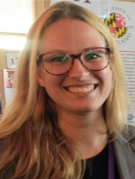 Bacteria grow in many dynamic niches, and therefore require mechanisms to sense and respond to changes in their environment. One common way of responding to extracellular changes is through the use of second messenger molecules, which regulate diverse phenotypes. All of the currently identified second messengers are biomedically relevant, as they regulate phenotypes important for virulence of many pathogens. My research aims to reveal new regulatory targets for two of these signaling nucleotides—cyclic di-GMP and cyclic di-AMP.
Bacteria grow in many dynamic niches, and therefore require mechanisms to sense and respond to changes in their environment. One common way of responding to extracellular changes is through the use of second messenger molecules, which regulate diverse phenotypes. All of the currently identified second messengers are biomedically relevant, as they regulate phenotypes important for virulence of many pathogens. My research aims to reveal new regulatory targets for two of these signaling nucleotides—cyclic di-GMP and cyclic di-AMP.
| Year of Entry (Prior Degree and Institution) | 2014 B.S. Virginia Tech |
|---|---|
| Mentor-Dept (Grad program) | Winkler-CBMG (BISI-MOCB) |
| Time on Training Grant | Aug. 2018 – July, 2019 |
| Title of Research Project | Discovery of new second messenger targets during bacterial decision making |
| Publications | Weiss CA, Hoberg JA, Liu K, Tu BP, Winkler WC. (2019) Single-Cell Microscopy Reveals That Levels of Cyclic di-GMP Vary among Bacillus subtilis Subpopulations. J Bacteriol. 201(16):e00247-19. PMID: 31138629 |
| Presentations |
|
| Awards and Fellowships | |
| Degree Received (Year) | Ph.D. (2019) |
| Post Degree Positions (Grant Support) | Post-doctoral Fellow with Dr. Angelika Grundling at Imperial College London |
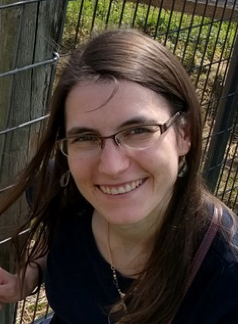 My research aims to gain better understanding of interactions between the antimicrobial peptide histatin-5 and a family of secreted aspartic proteases (Saps) produced by the fungal pathogen, Candida albicans. Histatin-5 is found in human saliva and has strong and specific antifungal activity against C. albicans. However, several of the Saps have been found to degrade and inactivate the antimicrobial peptide. To study the location of cleavage of the peptide caused by Saps, I am designing and testing variants of histatin-5 with amino acid substitutions. Through my work, I hope to gain further insight into how the proteases recognize the cleavage sites and then use this insight to design variants with reduced cleavage to improve the therapeutic potential of histatin-5.
My research aims to gain better understanding of interactions between the antimicrobial peptide histatin-5 and a family of secreted aspartic proteases (Saps) produced by the fungal pathogen, Candida albicans. Histatin-5 is found in human saliva and has strong and specific antifungal activity against C. albicans. However, several of the Saps have been found to degrade and inactivate the antimicrobial peptide. To study the location of cleavage of the peptide caused by Saps, I am designing and testing variants of histatin-5 with amino acid substitutions. Through my work, I hope to gain further insight into how the proteases recognize the cleavage sites and then use this insight to design variants with reduced cleavage to improve the therapeutic potential of histatin-5.

